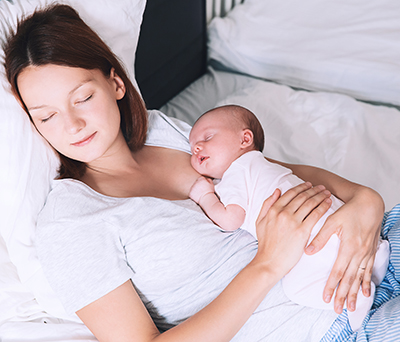
Congratulations, you’ve just had a baby! The newest member of your family is getting everyone’s undivided attention. However, you, the new mom, still need to take care of yourself – the next three months are important for your health and well-being.
The American College of Obstetricians and Gynecologists now recommend ongoing care for the new mom during the first three months after delivery. This special postpartum time is called the fourth trimester.
Washington University physician Camaryn Chrisman Robbins, MD, MPH, specializes in obstetrics and gynecology. She explains, “Ideally, I like to see my new mothers for an assessment within three weeks of giving birth. It helps to improve the health of both the mother and the baby.
One day a woman is pregnant and the next day she isn’t. So much is happening and changing in her body, it is important for her doctor to see her to make sure she is healing physically and emotionally.”
A new mother’s postpartum exam should include a full assessment of her emotional well-being, physical recovery from birth, sleeping patterns, infant care and feeding, sexuality, contraception, chronic disease management and health maintenance.
This sooner-rather-than -later visit is especially vital for new moms who might struggle with hypertension, postpartum depression or other common complications of pregnancy.
For breastfeeding moms, taking in adequate calories and staying hydrated is very important in addition to limiting caffeine and alcohol.
Women should talk to their doctor before resuming any physical activity including weightlifting, running, swimming or other strenuous exercises. However, once okayed by your obstetrician, engaging in these activities is beneficial for moms’ mental and physical health. For most women, walking starting in the weeks following delivery, either a vaginal delivery or cesarean section, is safe and encouraged.
Postpartum depression
It can be normal for a new mom to feel sad, anxious or irritable – especially in the first few days after giving birth. However, if the feelings worsen or don’t subside, it could be a sign of postpartum depression. Family members and partners should be alert to the most common signs:
- Crying
- Irritability
- Anxiety
- Guilt
- Feeling detached from the baby
A new mom needs support — both emotionally and physically. Postpartum depression not only affects her, it affects her entire family. The family is critical in helping the new mom in any way possible – with child care, going to doctor’s appointments with her, and most importantly, being aware of any signs of postpartum depression.
Please call 314-362-4211 to make an appointment.
Center for Advanced Medicine – South County
5201 Midamerica Plaza, Suite 1700
St. Louis, MO 63129
Barnes-Jewish Center for Outpatient Health
4901 Forest Park Ave., Suite 710
St. Louis, MO 63108